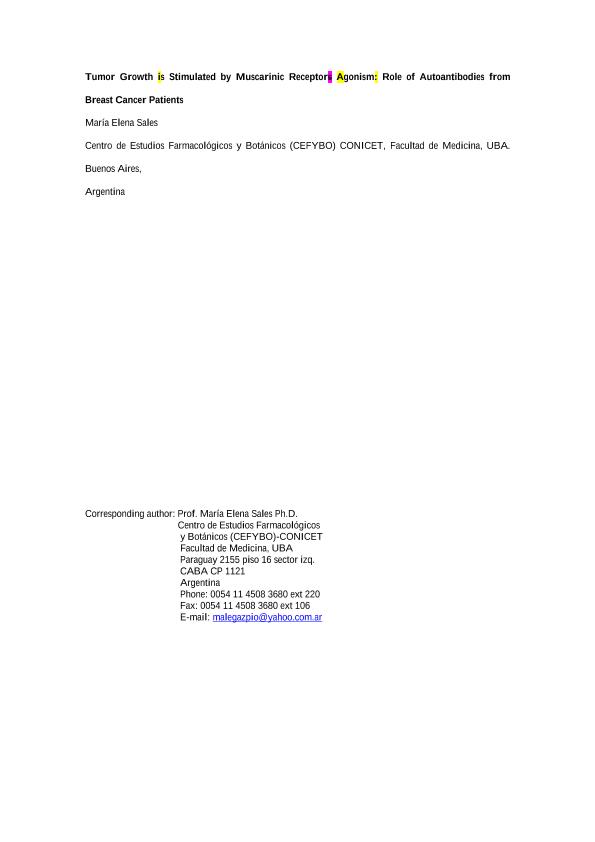Mostrar el registro sencillo del ítem
dc.contributor.author
Sales, Maria Elena

dc.date.available
2017-05-31T21:41:20Z
dc.date.issued
2012-04
dc.identifier.citation
Sales, Maria Elena; Tumor growth is stimulated by muscarinic receptors agonism: role of autoantibodies in breast cancer patients; Bentham Science Publishers; Immunology, Endocrine & Metabolic Agents in Medicinal Chemistry; 12; 3; 4-2012; 208-215
dc.identifier.issn
1871-5222
dc.identifier.uri
http://hdl.handle.net/11336/17236
dc.description.abstract
In developed countries, cancer has replaced infectious diseases as a major cause of death. Currently, efforts in the immunoprevention of cancer are beginning to resemble those presented by the prevention of infectious diseases by immunization a century ago. Breast cancer is the most frequent type of tumor in women and is the second leading cause of death by this illness, among them. Moreover, cancer incidence will grow during next years. Some findings in autoimmunity related to breast cancer in animal models have been important to clarify mechanisms that potentiate tumor growth. Clinical and experimental data now clearly indicate that chronic inflammation significantly contributes to cancer development. Emerging out of these studies is an appreciation that persistent humoral immune responses exacerbate recruitment and activation of innate immune cells in the neoplastic microenvironment where they regulate tissue remodeling, pro-angiogenic and pro-survival pathways that together potentiate cancer development. Generally, antigens involved in autoimmune response in breast cancer are modified self-proteins or over-expressed normal proteins that induce autoantibodies (autoAbs) formation, which exhibit tumor promoting actions. Very frequently muscarinic acetylcholine receptors (mAChR) are up-regulated in different types of tumors appearing in different animal species. mAChR have the ability to act as autoantigens for tumor bearers. This article will review recent results concerning to the ability of mAChR expressed in transformed breast cells to trigger autoAbs formation either in experimental models or in breast cancer patients. We will also discuss the action of these antibodies as agonists of mAChR.
dc.format
application/pdf
dc.language.iso
eng
dc.publisher
Bentham Science Publishers

dc.rights
info:eu-repo/semantics/openAccess
dc.rights.uri
https://creativecommons.org/licenses/by-nc-sa/2.5/ar/
dc.subject
Autoantibodies
dc.subject
Muscarinic Receptors
dc.subject
Breast Cancer
dc.subject
Tumor Growth
dc.subject
Mcf-7 T1n0mx Breast Tumors
dc.subject
Autoantigens
dc.subject
Cells Proliferation
dc.subject
Inositol Monophosphate
dc.subject
Nitric Oxide Synthase
dc.subject
Phospholipase Cβ2
dc.subject
Protein Kinase C
dc.subject
Tumor Progression
dc.subject.classification
Otras Ciencias de la Salud

dc.subject.classification
Ciencias de la Salud

dc.subject.classification
CIENCIAS MÉDICAS Y DE LA SALUD

dc.title
Tumor growth is stimulated by muscarinic receptors agonism: role of autoantibodies in breast cancer patients
dc.type
info:eu-repo/semantics/article
dc.type
info:ar-repo/semantics/artículo
dc.type
info:eu-repo/semantics/publishedVersion
dc.date.updated
2017-05-31T20:03:52Z
dc.journal.volume
12
dc.journal.number
3
dc.journal.pagination
208-215
dc.journal.pais
Emiratos Árabes Unidos

dc.journal.ciudad
Sharjah
dc.description.fil
Fil: Sales, Maria Elena. Consejo Nacional de Investigaciones Científicas y Técnicas. Oficina de Coordinación Administrativa Houssay. Centro de Estudios Farmacológicos y Botánicos. Universidad de Buenos Aires. Facultad de Medicina. Centro de Estudios Farmacológicos y Botánicos; Argentina
dc.journal.title
Immunology, Endocrine & Metabolic Agents in Medicinal Chemistry
dc.relation.alternativeid
info:eu-repo/semantics/altIdentifier/url/http://www.ingentaconnect.com/content/ben/iemamc/2012/00000012/00000003/art00004?crawler=true
dc.relation.alternativeid
info:eu-repo/semantics/altIdentifier/doi/http://dx.doi.org/10.2174/187152212802001839
Archivos asociados
